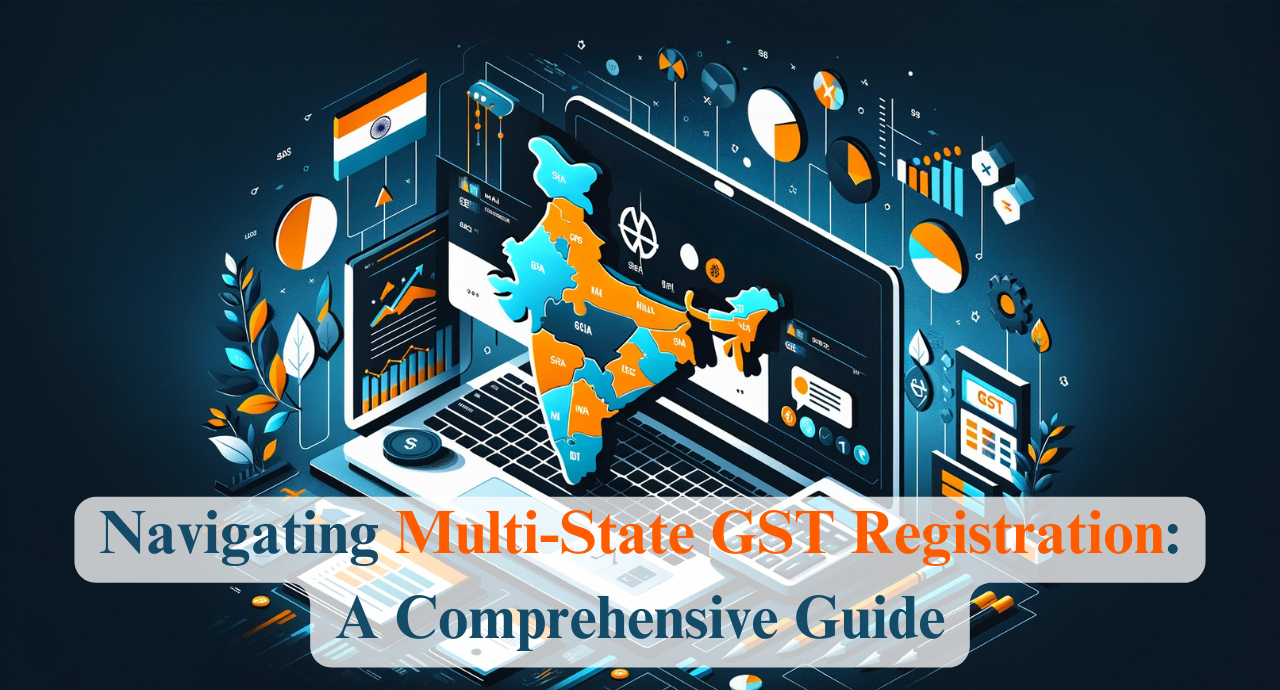Navigating GST Registration for Multi-State Operations


In the evolving landscape of India's Goods and Services Tax (GST), a pivotal question that businesses operating across multiple states face is whether separate GST registrations are necessary for each state. This issue is crucial for ensuring compliance, optimizing tax liabilities, and facilitating smooth operations. In this comprehensive guide, we will explore the intricacies of GST registration for multi-state branches, aiming to provide clarity and guidance to businesses navigating this complex terrain.
GST, a unified tax system, replaced various indirect taxes in India. It's essential for businesses to understand how GST differs from previous tax structures, particularly for operations spanning multiple states.
Operating in multiple states under the GST regime requires a clear understanding of compliance requirements in each state. This section explains these impacts and the need for awareness of diverse state regulations.
We delve into what GST registration involves, including the criteria for mandatory registration for businesses across different states.
Understanding the legal mandates surrounding GST is crucial for businesses. This section covers the specific legal requirements as outlined in the GST Act, with a focus on provisions related to multi-state operations.
Here, we explore when a business is required to register in each state it operates in. This includes illustrative examples to clarify scenarios that necessitate separate registrations.
Non-compliance with GST registration requirements can lead to significant penalties and legal issues. We emphasize the importance of timely and accurate GST registration.
This section provides a step-by-step guide to the GST registration process for businesses operating in multiple states, including any state-specific differences in the registration process.
A comprehensive list of documents required for GST registration is provided, along with tips for maintaining compliance and keeping records current.
Practical advice on using the GST portal effectively is offered, including solutions to common issues encountered during online registration.
You're right, the tables in the previous sections were examples and not exhaustive. Let's complete those and then proceed with the next sections of the blog.
Enhancing Compliance and Ease of Operations
Separate GST registrations for each state can simplify tax filing and compliance, allowing businesses to manage state-wise accounts and taxes independently, leading to improved operational efficiency.
This section explores the financial benefits, such as easier management of Input Tax Credits (ITC) and strategic advantages like better market penetration and operational control.
We include real-life examples of businesses that have benefitted from separate GST registrations, drawing lessons and best practices from these case studies.
Businesses face challenges like reconciliation issues, compliance complexities, and reporting discrepancies when managing multiple GST registrations. This section provides an overview of these common challenges.
We offer strategies and tips for effectively managing multi-state GST registrations, including leveraging technology for compliance and reporting.
This part includes advice from industry experts on staying ahead of regulatory changes and compliance requirements in a multi-state scenario.
Common Challenges and Solutions in Multi-State GST Management
Navigating the complexities of GST registration for businesses operating across multiple states in India is not just about legal compliance; it's about making strategic decisions that can impact the financial health and operational efficiency of the business. This comprehensive guide aimed to shed light on the various aspects of multi-state GST registration, from understanding the basics, legal requirements, the registration process, to exploring the benefits and addressing the challenges.
The GST landscape is continually evolving. Businesses need to stay informed and agile to adapt to regulatory changes. Regular updates, educational workshops, and active engagement with tax professionals can help businesses navigate these changes effectively.
A1: Yes, as per GST law, if your business has operations in multiple states, separate GST registration for each state is usually required. This is to ensure proper tax compliance and filing in each jurisdiction.
A2: Failing to register under GST can lead to penalties including fines and legal action. The penalty is typically a percentage of the tax amount due, subject to a minimum amount. It's important to comply with GST regulations to avoid these penalties.
A3: Yes, the GST portal allows businesses to manage multiple state registrations. However, each state registration requires separate documentation and compliance measures.
A4: Separate GST registrations can help in better management of Input Tax Credits (ITC) and ensure compliance with state-specific tax laws, which can ultimately lead to financial benefits like tax savings and efficient tax planning.
A5: While separate GST registration can be a compliance challenge for small businesses, it also offers the benefit of clear financial segregation between states. Businesses can use technology and professional assistance to manage these requirements more effectively.
A6: The official GST portal, along with state government websites, are reliable sources for the latest information on GST regulations. Additionally, consulting with a tax professional can provide tailored advice and updates.

|
Essential LLP Registration Documents: A Complete Checklist for Entrepreneurs Author: Rahul Singh 04 Apr, 2024
|
Get inspired by these stories.